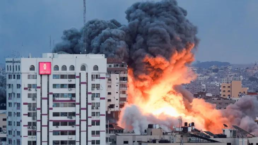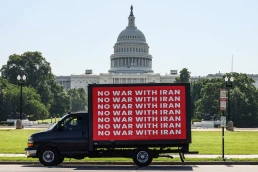As one former official who served at the embassy put it, the unwritten policy was to “protect Israel from scrutiny” and facilitate the arms flow no matter how many human rights abuses are reported.
By Brett Murphy, ProPublica
In late January, as the death toll in Gaza climbed to 25,000 and droves of Palestinians fled their razed cities in search of safety, Israel’s military asked for 3,000 more bombs from the American government. U.S. Ambassador to Israel Jack Lew, along with other top diplomats in the Jerusalem embassy, sent a cable to Washington urging State Department leaders to approve the sale, saying there was no potential the Israel Defense Forces would misuse the weapons.

The cable did not mention the Biden administration’s public concerns over the growing civilian casualties, nor did it address well-documented reports that Israel had dropped 2,000-pound bombs on crowded areas of Gaza weeks earlier, collapsing apartment buildings and killing hundreds of Palestinians, many of whom were children. Lew was aware of the issues. Officials say his own staff had repeatedly highlighted attacks where large numbers of civilians died. Homes of the embassy’s own Palestinian employees had been targeted by Israeli airstrikes.
Still, Lew and his senior leadership argued that Israel could be trusted with this new shipment of bombs, known as GBU-39s, which are smaller and more precise. Israel’s air force, they asserted, had a “decades-long proven track record” of avoiding killing civilians when using the American-made bomb and had “demonstrated an ability and willingness to employ it in [a] manner that minimizes collateral damage.”
While that request was pending, the Israelis proved those assertions wrong. In the months that followed, the Israeli military repeatedly dropped GBU-39s it already possessed on shelters and refugee camps that it said were being occupied by Hamas soldiers, killing scores of Palestinians. Then, in early August, the IDF bombed a school and mosque where civilians were sheltering. At least 93 died. Children’s bodies were so mutilated their parents had trouble identifying them.
Weapons analysts identified shrapnel from GBU-39 bombs among the rubble.
In the months before and since, an array of State Department officials urged that Israel be completely or partially cut off from weapons sales under laws that prohibit arming countries with a pattern or clear risk of violations. Top State Department political appointees repeatedly rejected those appeals. Government experts have for years unsuccessfully tried to withhold or place conditions on arms sales to Israel because of credible allegations that the country had violated Palestinians’ human rights using American-made weapons.
Recent Posts
A War With Iran Would Not Be a One-Off Event But a Disastrous Ongoing Rupture
February 26, 2026
Take Action Now If Congress cedes its power to stop a war with Iran, it will fully erode any lingering promise of democratic restraint.By Hanieh…
New Addition to List of Nuclear Near Catastrophes
February 25, 2026
Take Action Now Debris flew for great distances — many times the distance of 270 meters to a nuclear reactor and nuclear storage facility.By David…
Gavin Newsom’s last budget belies his ‘California for All’ pledge
February 24, 2026
Take Action Now Yet, even as the state is poised to lose billions in federal funding, and millions of Californians are losing access to health care…
Israel and American Hawks are Pushing U.S. to Iran War With Catastrophic Consequences
February 23, 2026
Take Action Now At the World Health Assembly in May, member states may endorse an unprecedented strategy declaring that health is not a cost – but…




